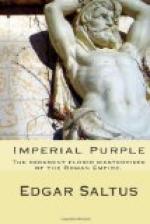He had entered the world like a tiger cub, feet first; a circumstance which is said to have disturbed his mother, and well it might. During his adolescence that lady made herself feared. He was but seventeen when the pretorians called upon him to rule the world; and at the time an ingenuous lad, one who blushed like Lalage, very readily, particularly at the title of Father of the Country, which the senate was anxious to give him; endowed with excellent instincts, which he had got no one knew whence; a trifle petit maitre, perhaps, perfuming the soles of his feet, and careful about the arrangement of his yellow curls, but withal generous, modest, sympathetic—in short, a flower in a cesspool, a youth not over well-fitted to reign. But his mother was there; as he developed so did his fear of her, to such proportions even that he gave certain orders, and his mother was killed. That duel between mother and son, terrible in its intensity and unnameable horror, even the Borgias could not surpass. Tacitus has told it, dramatically, as was his wont, but he told it in Latin, in which tongue it had best remain.
At that time the ingenuous lad had disappeared. The cub was full-grown. Besides, he had tasted blood. Octavia, who with her brother, Britannicus, and her sister, Antonia, had been his playmates; who was almost his own sister; whose earliest memories interlinked with his, and who had become his wife, had been put to death; not that she had failed to please, but because a lady, Sabina Poppoea, who, Tacitus says, lacked nothing except virtue, had declined to be his mistress. At the time Sabina was married. But divorce was easy. Sabina got one at the bar; Nero with the axe. The twain were then united. Nero seems to have loved her greatly, a fact, as Suetonius puts it, which did not prevent him from kicking her to death. Already he had poisoned Britannicus, and with Octavia decapitated and Agrippina gone, of the imperial house there remained but Antonia and himself. The latter he invited to marry him; she declined. He invited her to die. He was then alone, the last of his race. Monsters never engender. A thinker who passed that way thought him right to have killed his mother; her crime was in giving him birth.
Therewith he was popular; more so even than Caligula, who was a poet, and as such apart from the crowd, while Nero was frankly canaille—well-meaning at that—which Caligula never was. During the early years of his reign he could not do good enough. The gladiators were not permitted to die; he would have no shedding of blood; the smell of it was distasteful. He would listen to no denunciations; when a decree of death was brought to him to sign, he regretted that he knew how to write. Rome had never seen a gentler prince, nor yet one more splendidly lavish. The people had not only the necessities of life, but the luxuries, the superfluities, too. For days and days in the Forum there was an incessant shower of tickets that were exchangeable, not for bread or trivial sums, but for gems, pictures, slaves, fortunes, ships, villas and estates. The creator of that shower was bound to be adored.




